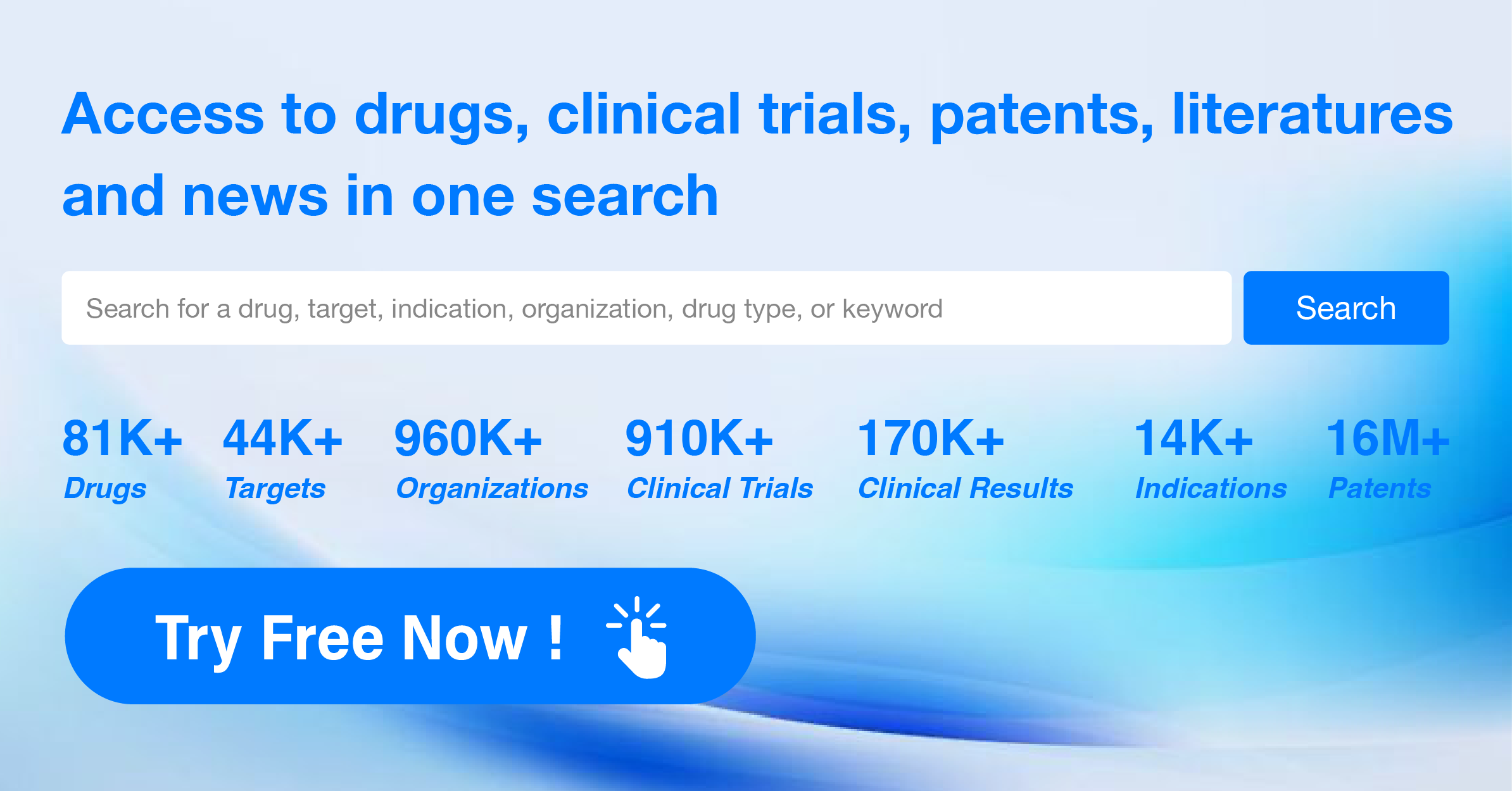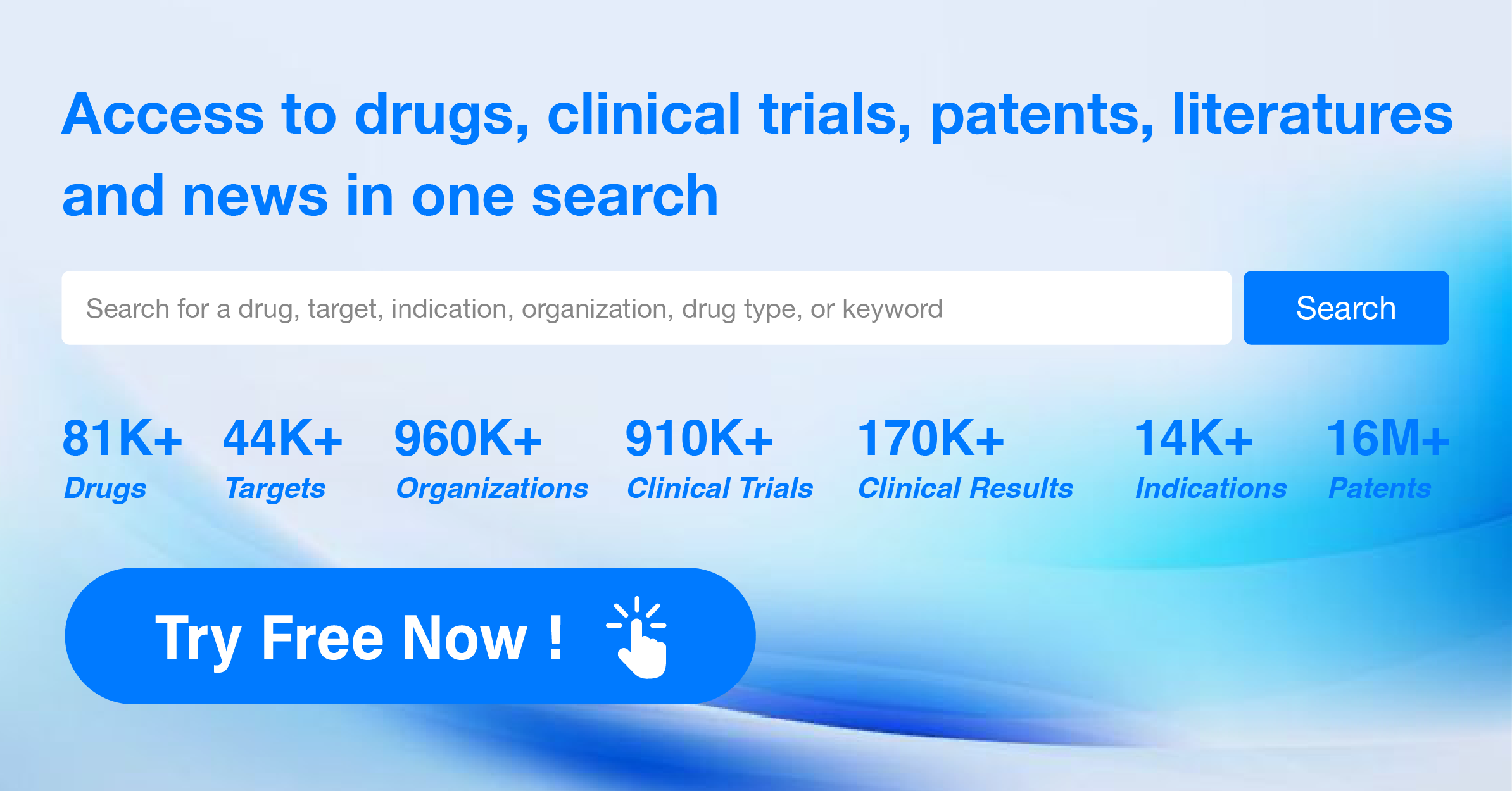Global New Drug Research and Development Progress Weekly Report(4.1-4.7)
Global Pharmaceutical Research and Development Progress
1.Positive Clinical Trial Results for Gritstone bio's GRANITE Vaccine in Combination Therapy
On April 2nd, Gritstone bio announced the latest positive outcomes from its clinical phase 2/3 trial part of phase 2 involving its investigational personalized cancer vaccine GRANITE in combination with an immune checkpoint inhibitor and fluorouracil/Bevacizumab monoclonal antibody as first-line maintenance treatment in patients with metastatic microsatellite-stable colorectal cancer (MSS-CRC). The analysis indicated an early trend of benefit for patients in the GRANITE group in terms of progression-free survival (PFS) data (HR=0.82, 95% CI: 0.34-1.67), as well as an extended PFS benefit for high-risk patients (HR=0.52, 95% CI: 0.15-1.38), whose disease progressed more quickly. An analysis of circulating tumor DNA (ctDNA) conducted months after treatment initiation suggested a correlation between ctDNA levels and disease progression which favored the group receiving the GRANITE combination therapy. GRANITE has been granted Fast Track designation by the U.S. FDA for the treatment of MSS-CRC patients.
2.Equillium Announces Positive Results for Itolizumab Monoclonal Antibody in Treating Lupus Nephritis
On April 2nd, Equillium reported positive topline data from part B of its phase 1b EQUALIZE clinical trial. The study aimed to assess the efficacy and safety of its investigational monoclonal antibody itolizumab in patients with lupus nephritis. Results demonstrated, when itolizumab was used in conjunction with mycophenolate mofetil/mycophenolic acid (MMF/MPA) and corticosteroids, a higher proportion of patients attained complete remission (CR) and partial remission (PR) compared to standard therapy and the reduction in urine protein-creatinine ratio (UPCR) was more rapid and significant. This trial outcome is one of two required data sets for Ono Pharmaceutical to make an informed decision regarding their rights to itolizumab.
3.Priovant Plans to Initiate Phase 3 Clinical Trials for TYK2/JAK1 Dual Inhibitor
On April 2nd, Priovant Therapeutics announced that its investigational TYK2/JAK1 dual inhibitor brepocitinib achieved its primary endpoint and several key secondary endpoints in the phase 2 clinical trial NEPTUNE for treating non-infectious uveitis (NIU). The press release indicated findings which showed the efficacy of brepocitinib was approximately double that of approved non-steroidal therapies in corresponding registration studies. Based on these positive results, the company plans to launch phase 3 clinical trials in the second half of the year to further assess the effect of brepocitinib in treating NIU. The primary endpoint of the trial is the treatment failure rate at week 24, a composite endpoint including various measures of eye inflammation and vision, as well as discontinuation or starting rescue therapy due to adverse events. The results indicated a treatment failure rate of 29% (5/17) in the 45mg dose group and 44% (4/9) in the 15mg dose group at week 24, with lower failure rates indicating higher efficacy. In the 45mg group, the treatment failure rate due to disease progression was 18%. Priovant plans to provide additional safety and efficacy data at future medical conferences and anticipates initiating a phase 3 clinical trial for treating NIU in the second half of 2024.
4.Jazz Pharmaceuticals and Zymeworks Announce Completion of FDA Submission for HER2-Targeted Bispecific Antibody Zanidatamab
On April 3rd, Jazz Pharmaceuticals and Zymeworks jointly announced that they have completed a rolling submission of a Biologics License Application (BLA) to the U.S. Food and Drug Administration (FDA) seeking accelerated approval for their collaboratively developed investigational HER2-targeted bispecific antibody, zanidatamab. The treatment is intended for patients with previously treated, unresectable, locally advanced or metastatic HER2-positive biliary tract cancer (BTC). If approved, zanidatamab would be the first FDA-approved HER2-targeting drug for the treatment of BTC. The application for the BLA is primarily supported by data from the HERIZON-BTC-01 Phase 2b clinical trial, which evaluated the efficacy and safety of zanidatamab in patients with previously treated HER2-positive BTC. The trial's primary endpoint was the confirmed objective response rate (cORR) as assessed by an Independent Central Review (ICR). Zanidatamab demonstrated a manageable and tolerable safety profile, with only 2 patients (2.3%) experiencing adverse events (AEs) leading to the discontinuation of treatment within the HERIZON-BTC-01 trial. There were no grade 4 adverse events and no treatment-related deaths reported. Recruitment is ongoing for zanidatamab in the HERIZON-BTC-302 Phase 3 clinical trial, targeting first-line treatment for advanced or metastatic HER2-positive BTC patients.
5.Vanda's Small Molecule Therapy for Acute Treatment of Bipolar I Disorder Receives FDA Approval
On April 3rd, Vanda Pharmaceuticals announced that the U.S. FDA has approved its medication Fanapt (iloperidone) tablets for the acute treatment of manic or mixed episodes associated with Bipolar I Disorder (BP-I) in adults. The approval was primarily based on a pivotal randomized trial involving approximately 400 patients. The trial's primary endpoint involved assessing patients at week 4 using the Young Mania Rating Scale (YMRS), which is a clinical severity scale for core symptoms of mania. At the end of the study (week 4), patients treated with Fanapt exhibited significantly greater improvements compared to those in the placebo group, with a highly statistically significant difference (p=0.000008). YMRS assessments were conducted at the end of weeks 1, 2, 3, and 4. Fanapt, an atypical antipsychotic small molecule drug, was previously approved by the FDA in 2009 for the acute treatment of schizophrenia.
6.LyGenesis' Regenerative Cell Therapy Cultivates Mini-livers, First Patient Treated
On April 3rd, LyGenesis announced that the first patient with end-stage liver disease (ESLD) has been treated in its Phase 2a clinical trial with a potential "first-in-class" regenerative cell therapy. This therapy transplants healthy donor liver cells into the lymph nodes of ESLD patients with the aim of growing one or more ectopic mini-livers within the lymph nodes. These mini-livers are intended to compensate for the damaged liver function and potentially save the lives of patients with end-stage liver disease. The press release noted that this marks the first time in a clinical trial that a patient's own lymph nodes have been used as "bioreactors" to grow ectopic organs, representing a significant milestone in the field of regenerative medicine. The regenerative cell therapy of LyGenesis is based on research by the company’s founder, Professor Eric Lagasse at the University of Pittsburgh.
7.Legend Biotech/Janssen's Carvykti Receives FDA Approval for Second-Line Treatment of Multiple Myeloma
On April 5, Legend Biotech and Janssen jointly announced that the U.S. FDA has approved Carvykti (ciltacabtagene autoleucel, cilta-cel) for the treatment of patients with relapsed or refractory multiple myeloma (R/R MM) who have received at least one prior therapy including a proteasome inhibitor (PI) and an immunomodulatory agent (IMiD), and who are lenalidomide-refractory. Carvykti is the first and only B-cell maturation antigen (BCMA)-directed therapy approved for second-line treatment in multiple myeloma patients, encompassing CAR-T therapy, bispecific antibodies, and antibody-drug conjugates (ADCs). The FDA’s approval is based on the positive results from the CARTITUDE-4 study, which evaluated the efficacy and safety of Carvykti in comparison with pomalidomide, bortezomib, and dexamethasone (PVd) or daratumumab, pomalidomide, and dexamethasone (DPd) in patients with multiple myeloma who were relapsed after 1-3 prior therapies and were lenalidomide-refractory.
8.Enhertu Receives FDA Approval for Treatment of HER2-Positive Solid Tumors
On April 6, AstraZeneca and Daiichi Sankyo jointly announced that Enhertu (trastuzumab deruxtecan) has been granted accelerated approval by the U.S. FDA for the treatment of adults with unresectable or metastatic HER2-positive (IHC 3+) solid tumors who have received previous systemic treatment and for whom there are no satisfactory alternative treatment options. Trastuzumab deruxtecan is a HER2-targeted antibody-drug conjugate (ADC) designed using Daiichi Sankyo's proprietary DXd ADC technology, with a HER2 monoclonal antibody linked via a stable tetrapeptide cleavable linker to a topoisomerase I inhibitor payload (a derivative of exatecan). The product is being developed and commercialized globally by Daiichi Sankyo and AstraZeneca, with Daiichi Sankyo holding exclusive commercialization rights in Japan. The FDA's accelerated approval for this indication is based on the objective response rate (ORR) and duration of response (DoR) in HER2-positive IHC 3+ subgroup of patients in the DESTINY-PanTumor02, DESTINY-Lung01, and DESTINY-CRC02 trials. Full approval may depend on verification and description of clinical benefit in confirmatory trials. The DESTINY-PanTumor02 study is a global, multicenter, open-label, multi-cohort phase II clinical trial aimed at evaluating the efficacy and safety of Enhertu (5.4mg/kg) in patients with previously treated locally advanced, unresectable or metastatic HER2-expressing solid tumors.
9.AstraZeneca Announces Positive Phase 3 Clinical Results for Heavyweight PD-L1 Inhibitor
On April 6th, AstraZeneca announced positive top-line results from the Phase 3 clinical trial ADRIATIC for its heavyweight PD-L1 inhibitor, Imfinzi. Compared to placebo, statistically significant and clinically meaningful improvements were observed in both primary endpoints, overall survival (OS) and progression-free survival (PFS), in patients with limited-stage small cell lung cancer (LS-SCLC) who did not progress after concurrent chemoradiotherapy (CRT). Small cell lung cancer is a highly aggressive form of lung cancer, and despite an initial response to chemotherapy and radiotherapy, patients with LS-SCLC typically relapse and progress rapidly. The 5-year survival rate for LS-SCLC patients is only between 15-30%. Imfinzi is a humanized monoclonal antibody that inhibits tumor immune evasion by binding to PD-L1 and blocking its interaction with PD-1 and CD80 proteins. AstraZeneca has stated that detailed results of the trial will be presented at an upcoming medical conference and shared with regulatory authorities worldwide. Furthermore, the trial arm testing the combination of the anti-CTLA-4 antibody Imjudo with Imfinzi for this patient group is still blinded, with the trial continuing until the next scheduled interim analysis.
10.Roche’s Rituximab Subcutaneous Injection Approved for Marketing in China
On April 7th, Roche's rituximab subcutaneous injection (trade name: MabThera sc) was approved for marketing. Rituximab is a CD20 monoclonal antibody developed by Roche in collaboration with Biogen. Its intravenous form was approved for marketing in the United States in November 1997 under the trade name MabThera, for the treatment of diffuse large B-cell lymphoma (DLBCL) and was approved for marketing in China in 2000. Rituximab subcutaneous injection is an innovative dosage form developed by Roche using Halozyme Therapeutics' Enhanze technology and was first approved for marketing in the European Union in March 2014 under the trade name MabThera sc. Enhanze is a drug delivery platform technology developed by Halozyme based on recombinant human hyaluronidase PH20 (rHuPH20), a human enzyme analog that can degrade hyaluronic acid. As a "molecular scalpel," the Enhanze technology facilitates the penetration and dispersion of drugs by temporarily opening subcutaneous vascular channels, with the incision returning to normal within 24 hours. In addition to MabThera sc, Roche has developed subcutaneous injection formulations of the monoclonal antibodies trastuzumab and pertuzumab/trastuzumab combination using Enhanze technology. The former (Herceptin SC) was first marketed in the European Union in September 2013, and the latter (Phesgo) was first marketed in the United States in June 2020.
For more information on the progress of drug development, please follow the Synapse database.
Dynamics of Global Pharmaceutical Trade Cooperation
1.Ipsen Acquires Potential "Best-in-Class" ADC for $900 Million
On April 3rd, Ipsen and Sutro Biopharma jointly announced that the two companies reached a global exclusive licensing agreement with a total value of up to $900 million for Sutro's investigational antibody-drug conjugate (ADC), STRO-003. STRO-003 will become the first ADC candidate in Ipsen's product portfolio. STRO-003 is a next-generation ROR1-targeting ADC, which employs Sutro's site-specific technology to generate highly stable conjugates with the potent payload exatecan. ROR1 is overexpressed in many different types of cancer, including solid tumors and hematologic malignancies. In preclinical studies, STRO-003 has demonstrated robust monotherapy efficacy and a differentiated safety profile, with the potential to become a "best-in-class" therapeutic. STRO-003 is currently in the final stages of preclinical development and is about to enter Phase 1 clinical trials. ROR1 plays an important role in various physiological processes by mediating non-canonical Wnt signaling pathways, including regulating cell division, proliferation, migration, and chemotaxis. ROR1 has low or negligible expression in normal tissues but is differentially overexpressed in a variety of solid and blood cancers. Furthermore, ROR1 has been shown to be associated with cancer cell survival and proliferation. Under the terms of the agreement, Ipsen will be responsible for the preparation of the Phase 1 clinical trial of STRO-003, including the submission of the IND application, as well as all subsequent clinical development and global commercialization activities. Sutro is eligible to receive up to $900 million in potential upfront payments, development, regulatory, and commercial milestones, including an approximate $90 million in near-term payments, depending on the successful development and commercialization of the drug.
2.Obio Technology Enters Strategic Collaboration with Shenzhen Hongxin Biotechnology to Advance Nucleic Acid Therapeutics
Recently, Obio Technology (Obio Technology (Shanghai) Co., Ltd.) and Shenzhen Hongxin Biotechnology announced the official signing of a strategic cooperation agreement. The two parties will engage in comprehensive collaboration in the field of Lipid Nanoparticle (LNP) delivery systems to jointly promote the clinical application of mRNA and other nucleic acid products in vaccines, cancer treatment, and other areas. This partnership aims to provide customers with comprehensive, high-quality services, empower the industry, and benefit patients.





